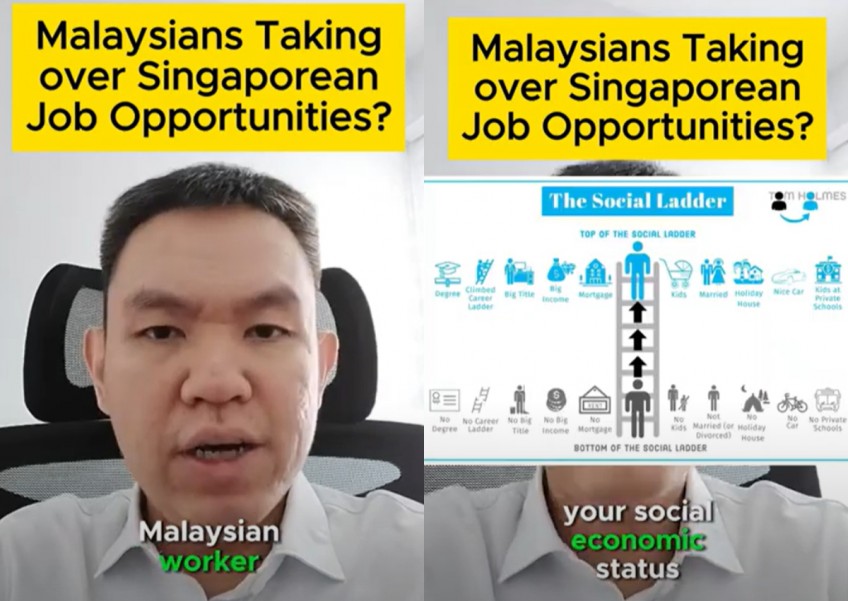YouTuber says Malaysians' willingness to do 'dirty, dangerous, and demeaning' jobs sets them apart from Singaporeans


 PUBLISHED ONFebruary 22, 2024 4:10 AMByClaudia Tan
PUBLISHED ONFebruary 22, 2024 4:10 AMByClaudia TanDirty, demeaning and dangerous - these are the types of jobs that 'true-blue' Singaporeans will shun, but not Malaysians, says one YouTuber.
And that's why Malaysians possess several advantages over Singaporeans in the job market, said CFLieu in a five-minute video on Wednesday (Feb 21).
According to his website, Lieu is a certified and licensed financial advisor in Malaysia.
He began his explanation by saying that there typically two types of Malaysians working in Singapore.
The first is what he described as "underqualified but hardworking".
Lieu recounted that he spotted a job listing for a dishwasher at a restaurant in Orchard Road last year, which offered a pay of $3,500.
"This is a good example of a 3D job - dirty, demeaning and dangerous - that a true blue Singaporean would not touch with a 10-foot pole," he said.
"But that means a five-figure ringgit monthly pay opportunity."
[embed]https://www.youtube.com/watch?v=HXAWIMhKhwg&t=8s[/embed]
He went on to describe the second type of Malaysian worker in Singapore - the "professional, highly-skilled and also hardworking".
These professionals usually earn about $8,000 to $15,000 a month, claimed Lieu.
"This is where you, a Malaysian, are on the fast track to upgrading your socioeconomic status (SES) when you repatriate money back to Malaysia, slowly but surely."
Circling back to the example of the dishwasher, Lieu said that those working in Singapore may suffer a temporary drop in their SES from renting a room and "eating cai fan every day".
However, by earning Singapore dollars, these workers will slowly gain more options in life later on, such as being able to afford a better house or car back home, he explained.
On the flipside, those residing in Singapore may not feel that they have as much freedom to upgrade their SES, he said.
"Any average person can feel emotionally imbalanced when they feel they are not qualified to compete for high-paying jobs in their home country, yet [they] feel too atas to wash dishes.
"You can't help but feel stuck... you're not climbing up the socioeconomic ladder, yet you always have this constant worry and fear of dropping down the same ladder."
In these cases, Lieu urged Malaysians to empathise with such individuals.
"The fact is this, if any native Singaporean can do any job better, faster and cheaper than Malaysians, no Malaysians can ever take away their job opportunities."
"If Malaysians are willing to do a job at a lower Singapore dollar pay...isn't that also a Singaporean employer issue?" he said.
A study conducted in 2022 by Malaysian authorities showed that two-thirds of Malaysians working in Singapore earn a gross salary of between $1,500 and $3,599 a month, reported CNA.
One in five Malaysian workers living here earns between $3,600 and $9,999 a month, with the highest grossing salary being $18,000.
Respondents said that they were attracted to job opportunities in Singapore due to the good prospects, favourable working conditions, attractive salaries and an advantageous exchange rate.
However, the study did not indicate how many Malaysians working in Singapore were polled.
Alongside the study, the Malaysian authorities also released a media statement which warned of the "adverse effects" of brain drain as more skilled workers leave the country.
They said that Malaysia must "reframe" the narrative around brain drain, and try to get those who have found work in other countries to eventually return.
claudiatan@asiaone.com